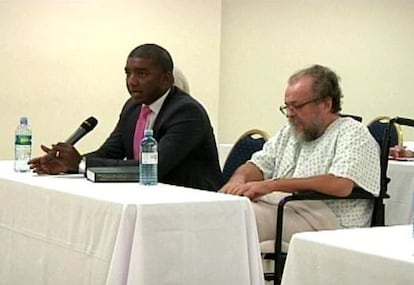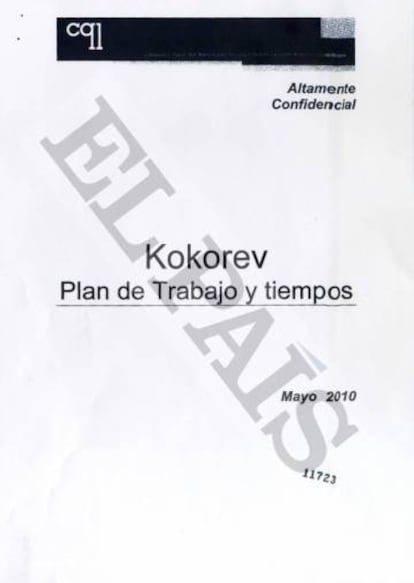Obiang’s Russian front man in Spain paid €140,000 for smear campaign
Spanish journalists investigating leader of Equatorial Guinea targeted by Vladimir Kokorev

An alleged front man for the President of Equatorial Guinea, a Russian named Vladimir Kokorev, paid a Madrid communications agency €140,000 to whitewash his own family’s reputation and to investigate a lawyer and two journalists – one of them an EL PAÍS reporter – according to documents confiscated by police from the apartment of the now-jailed history professor in the Spanish capital.

Kokorev, who is alleged to have worked for Teodoro Obiang, attracted the attention of the authorities when it was discovered that he and his family had received more than €30 million from the state coffers of the oil-rich West African State, which was formerly a Spanish colony.
Along with his family, he was arrested in Panama and extradited to Spain, where the Spanish Tax Agency brought charges against him for fraud to the tune of €18 million.
The head of Quantumleap only remembered working for the Kokorevs when confronted with the contract
In an attempt to bury the past and clear the family name, the Kokorevs enlisted the services of the Quantumleap agency to query negative news on their activities, distribute positive reports on the African dictator and publish a book challenging the police and judicial investigation that has since led to Vladimir’s imprisonment as well as that of his wife Julie, who claims to be a journalist, and their son Igor, for money laundering and tax evasion. Their youngest son, Vladimir ‘Jr’, is still at large.
Quantumleap is run by Jesús Timoteo Álvarez, a professor of communications and journalism at Madrid’s Complutense University, who signed a contract in 2010, undertaking to build a webpage that reflected positively on the Kokorevs, launch what was termed “an elite qualitative investigation” and publish a book on Equatorial Guinea with the collaboration of students from the Complutense. These PR stunts would, in one way or another, involve a wide range of entities, including the Anti-Corruption Attorney’s Office, newspapers EL PAÍS, El Mundo and Canarias, banks, the Foreign Affairs Ministry, spokespeople from the Foreign Affairs Committee’s parliamentary groups, experts on Equatorial Guinea and the foreign affairs secretaries and coordinators from political parties across the spectrum in Spain.

According to the contract, “the work requires skill, discretion and intelligence, and calls for a professional team with a great deal of experience.”
The book, for example, would reveal the true role of the Kokorev family and their Kalunga Company in President Obiang’s affairs. The contract goes on to stipulate that the book would also form part of “a PR campaign, using lobbying techniques to target audiences and resolve the situation in which we find ourselves.”
According to the contract, the agency “would assign an author or two authors (either with a doctorate in journalism or studying for a doctorate) with the task of drawing up a report/thesis on the attempted coup in Equatorial Guinea in 2004. This report/thesis must include one or two chapters clarifying issues concerning the Kokorev family.” The estimated cost for this literary endeavor was to be €40,000.
Different jobs, different price tags
Concerning coverage on the Kokorevs in newspapers, particularly EL PAÍS, Quantumleap proposed “carrying out an elite qualitative investigation, using intelligence techniques to find out why those writing the articles kept returning to the story. We need to know the reasons behind this situation before we can come up with a strategy to tackle and solve it.” This, it was noted, would be “an expensive operation” costing between €15,000 to €27,000.
Among the documents confiscated by the police, are three detailed reports: one on the lawyer Manuel Ollé from the Spanish Pro Human Rights Association (APDHE) who filed a lawsuit against Obiang and triggered judicial proceedings against the dictator; a second concerns El Mundo journalist Antonio Rubio who reported on the case; and the third is a brief on an EL PAÍS journalist who has been investigating the Kokorevs since 2007, when €30 million was transferred to the Kalunga Company’s bank account in Las Palmas.

These reports are the result of Quantumleap’s so-called “elite qualitative investigation” and contain a detailed profile of each subject’s professional life and repeated insinuations about them of a false and grave nature that the Kokorevs managed to get published anonymously in Russian media outlets such as the old Soviet newspaper, Pravda.
Among these reports are handwritten notes, presumably penned by the employees of Quantumleap, pointing out that the bank accounts of the three subjects had been investigated. One note states: “Still to be determined,” and later speaks about the “origin of an unusual transaction in 2006”, but concludes that “there is no plot” linking the trio.
Quantumleap’s Jesús Timoteo Álvarez denies having signed “any contract” with Vladimir Kokorev, although he does admit meeting him on the Complutense University campus and trying to visit him in jail when he was arrested because “he’s a friend of mine, a good person and very intelligent”.
Only when presented with a signed receipt for the first installment of €35,000 and a copy of the contract entitled: “Kokorev: Work Plan and Schedule,” bearing Quantumleap’s logo and the words “Highly Confidential,” did he admit to having worked for him. “That was many years ago and I don’t remember much about it,” the professor told EL PAÍS. “I helped him to respond to the attacks he was under from the newspapers, and to look for ways of reacting to certain pieces of news – the profiles written by you, the journalists, if possible.”
When asked if the book on Equatorial Guinea had been published, Timoteo Álvarez answered that this was the case. When further questions about the book were posed such as what it was called, how many copies had been published and whether the authors were also Complutense lecturers, he replied: “I don’t know. I don’t remember. I would need to get permission from the authors to tell you the title of the book.”
One document indicates the bank accounts of a lawyer and two journalists were spied on
Álvarez denied that Quantumleap snooped on the bank accounts of the lawyer or the two journalists but admits that he commissioned Carmen Fernández Camacho, a professor of journalism at Madrid’s King Juan Carlos University to write a report of “journalistic expertise” to accompany a criminal lawsuit filed by Vladimir Kokorev against EL PAÍS for defamation and libel. Fernández Camacho’s report alleged that the information published by this newspaper had been “manipulated, falsified or simply invented.”
This lawsuit was summarily dismissed by Antonio Sáenz de San Pedro of Madrid’s Magistrates Court number 38, whose judicial writ pointed out that the articles in EL PAÍS were based on police reports and contained neutral or verified information. “They are not invented or superfluous assertions… rather they are the distillation of dense police reports, a fact none of the journalists attempted to hide,” he said.
Álvarez claims he does not recall how much he charged the Kokorevs for the report or how much he paid Fernández Camacho for writing this work of “journalistic expertise”.
English version by Heather Galloway.
Tu suscripción se está usando en otro dispositivo
¿Quieres añadir otro usuario a tu suscripción?
Si continúas leyendo en este dispositivo, no se podrá leer en el otro.
FlechaTu suscripción se está usando en otro dispositivo y solo puedes acceder a EL PAÍS desde un dispositivo a la vez.
Si quieres compartir tu cuenta, cambia tu suscripción a la modalidad Premium, así podrás añadir otro usuario. Cada uno accederá con su propia cuenta de email, lo que os permitirá personalizar vuestra experiencia en EL PAÍS.
¿Tienes una suscripción de empresa? Accede aquí para contratar más cuentas.
En el caso de no saber quién está usando tu cuenta, te recomendamos cambiar tu contraseña aquí.
Si decides continuar compartiendo tu cuenta, este mensaje se mostrará en tu dispositivo y en el de la otra persona que está usando tu cuenta de forma indefinida, afectando a tu experiencia de lectura. Puedes consultar aquí los términos y condiciones de la suscripción digital.








































